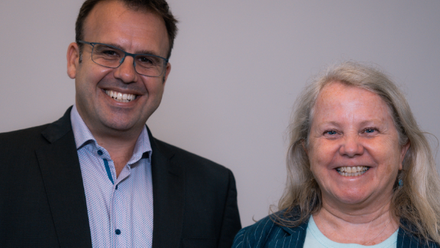A message from our CEO and President - July 2023
It’s two weeks since we spent three action packed days together in Birmingham at SOA23 and its fair to say that we’re still feeling the impact! We were all energised by spending time together. Time was spent catching up with old friends, making new connections, linking back up with our industry partners and starting new collaborations with others. Together we learnt about the latest cutting edge science, new applications in clinical practice, patient stories, quality improvement and the latest technologies and research. We learnt together, laughed together as a multi-professional intensive care community and renewed our networks.
We came away from SOA23 enthused and refreshed and noting the dates for Liverpool SOA24 in our diaries (its 18-20 June 2024 in case you want to put it in your diary too!). After opening SOA23 with a multi-professional plenary session on Workforce which involved representation from each of our Professional Advisory Groups and other keynote speakers, we felt poised and ready to review the much anticipated NHS Long Term Workforce Plan https://www.england.nhs.uk/publication/nhs-long-term-workforce-plan/. We had our arms open wide waiting for it to land and were planning to celebrate its publication while we ate our 75th NHS anniversary cupcakes. Unfortunately, we were not privy to an advance copy of the plan, so five years after it was due to be published we were waiting with bated breath to read its contents.
There is a welcomed expansion of the multi-professional workforce planned but detail is lacking particularly around the medical workforce, consultants, trainees and SAS and locally employed doctors. We need clarity on how many training and additional substantive posts will be available for our professions across Intensive Care. We also need to understand how educators and training time will be protected. Without trainers today, there is no workforce tomorrow.
Whilst recruitment is essential, we know that retention is a growing concern and arguably even more important. The longer-term impact of COVID-19 without any respite during a period of significant operational and financial pressure on the NHS and the cumulative impact (and underlying rationale relating to pay, terms and conditions) of industrial action has not helped. We risk running the bath without putting the plug in first if we do not ensure that retention and the solutions to address this problem are not quickly addressed.
The workforce plan is funded for 5 years with a commitment of 2.4 billion pounds until 2028/29. It is unclear what happens financially beyond this time but at the least there is some transparency (review progress and goals every 2 years) even though it’s not really offering ‘long term’ costed solutions. Let’s hope that the detail will follow, and we can look forward to a brighter period in the NHS which provides adequate numbers of trained staff to deliver timely and optimal patient care and staff who always feel valued with opportunities for personal and professional career development.
It is disappointing that the Intensive Care Society was not represented as a stakeholder in the Workforce Plan. It perhaps reflects a continued lack of understanding of the important role that critical care provides to both our acute and elective pathways and the wide reach and influence we have for patient experience and outcomes. We will continue to work with our members, key strategic partners and parliamentarians through our All-Party Parliamentary Group to help raise the profile and needs of intensive care professionals and our patients.
On a final note, the Society has been called as a witness to the COVID-19 inquiry. We welcome this opportunity to act on your behalf. We are your Society - we are here to represent your voice.


